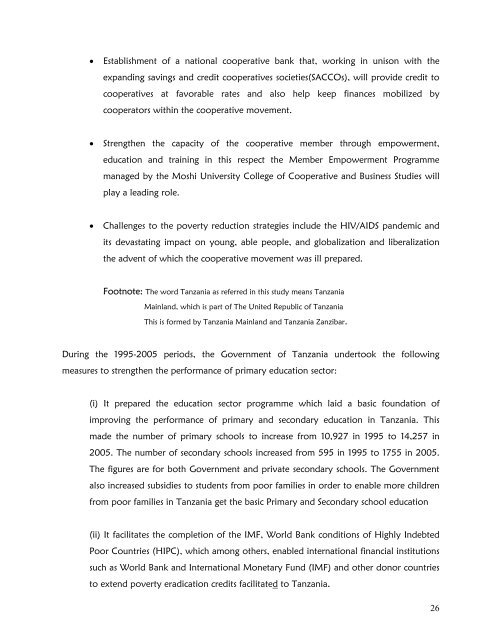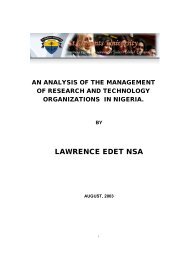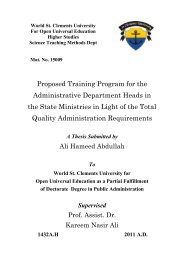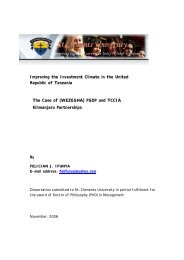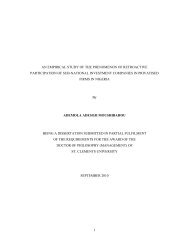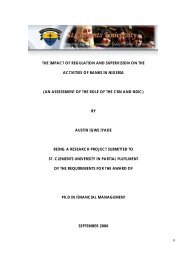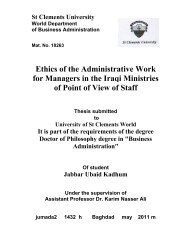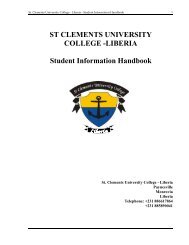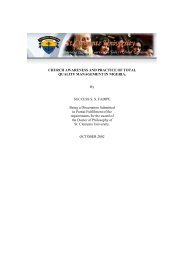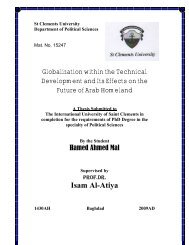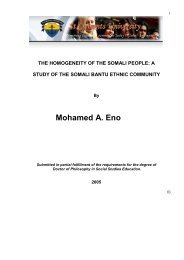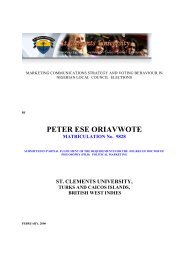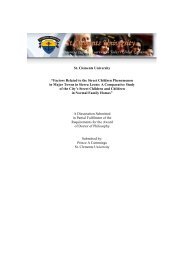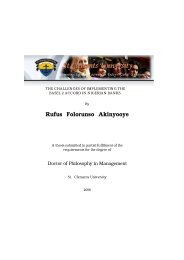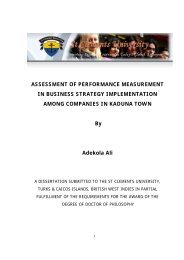The role of informal microfinance institutions in saving
The role of informal microfinance institutions in saving
The role of informal microfinance institutions in saving
Create successful ePaper yourself
Turn your PDF publications into a flip-book with our unique Google optimized e-Paper software.
• Establishment <strong>of</strong> a national cooperative bank that, work<strong>in</strong>g <strong>in</strong> unison with the<br />
expand<strong>in</strong>g sav<strong>in</strong>gs and credit cooperatives societies(SACCOs), will provide credit to<br />
cooperatives at favorable rates and also help keep f<strong>in</strong>ances mobilized by<br />
cooperators with<strong>in</strong> the cooperative movement.<br />
• Strengthen the capacity <strong>of</strong> the cooperative member through empowerment,<br />
education and tra<strong>in</strong><strong>in</strong>g <strong>in</strong> this respect the Member Empowerment Programme<br />
managed by the Moshi University College <strong>of</strong> Cooperative and Bus<strong>in</strong>ess Studies will<br />
play a lead<strong>in</strong>g <strong>role</strong>.<br />
• Challenges to the poverty reduction strategies <strong>in</strong>clude the HIV/AIDS pandemic and<br />
its devastat<strong>in</strong>g impact on young, able people, and globalization and liberalization<br />
the advent <strong>of</strong> which the cooperative movement was ill prepared.<br />
Footnote: <strong>The</strong> word Tanzania as referred <strong>in</strong> this study means Tanzania<br />
Ma<strong>in</strong>land, which is part <strong>of</strong> <strong>The</strong> United Republic <strong>of</strong> Tanzania<br />
This is formed by Tanzania Ma<strong>in</strong>land and Tanzania Zanzibar.<br />
Dur<strong>in</strong>g the 1995-2005 periods, the Government <strong>of</strong> Tanzania undertook the follow<strong>in</strong>g<br />
measures to strengthen the performance <strong>of</strong> primary education sector:<br />
(i) It prepared the education sector programme which laid a basic foundation <strong>of</strong><br />
improv<strong>in</strong>g the performance <strong>of</strong> primary and secondary education <strong>in</strong> Tanzania. This<br />
made the number <strong>of</strong> primary schools to <strong>in</strong>crease from 10,927 <strong>in</strong> 1995 to 14,257 <strong>in</strong><br />
2005. <strong>The</strong> number <strong>of</strong> secondary schools <strong>in</strong>creased from 595 <strong>in</strong> 1995 to 1755 <strong>in</strong> 2005.<br />
<strong>The</strong> figures are for both Government and private secondary schools. <strong>The</strong> Government<br />
also <strong>in</strong>creased subsidies to students from poor families <strong>in</strong> order to enable more children<br />
from poor families <strong>in</strong> Tanzania get the basic Primary and Secondary school education<br />
(ii) It facilitates the completion <strong>of</strong> the IMF, World Bank conditions <strong>of</strong> Highly Indebted<br />
Poor Countries (HIPC), which among others, enabled <strong>in</strong>ternational f<strong>in</strong>ancial <strong><strong>in</strong>stitutions</strong><br />
such as World Bank and International Monetary Fund (IMF) and other donor countries<br />
to extend poverty eradication credits facilitated to Tanzania.<br />
26


